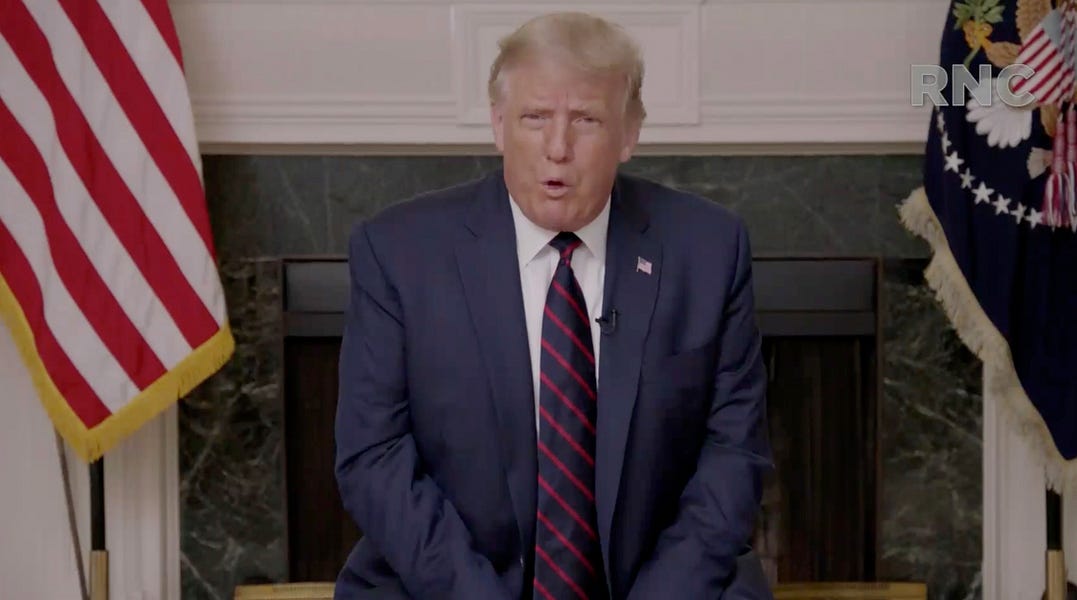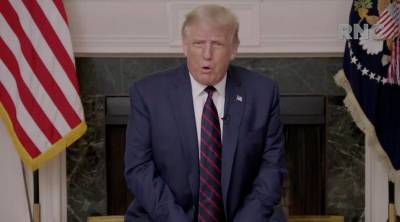With the Republican National Convention under way, it seems as though a big chunk of President Donald Trump’s re-election strategy has been crafted by the gnomes on the cartoon South Park. He should change that, if he wants to win.
In a now-famous South Park episode that originally aired in 1998 (but, conveniently, is now familiar to the younger generation as a meme), the gnomes offer a three-phase business plan: “gather the underpants,” followed by a question mark, and then, “profit.”
Trump’s team is pointing to his past economic success (call it Phase I) and arguing that he is uniquely qualified to lead a “Great American Comeback” once the pandemic has passed and that we will all profit. But he’s still got a great big question mark on the second phase of the plan: a strategy to actually defeat the pandemic.
Throughout this crisis, President Trump has failed to grapple effectively with the substance of an effective pandemic response. He has been loath to embrace social distancing, mask wearing, massive increases in COVID testing, contact tracing, and other techniques.
He has instead reveled in happy talk (“the virus will just go away”), quackery (hydroxychloroquine), wishful thinking (“Easter’s a very special day for me. Wouldn’t it be great to have all of the churches full? … I think it would be a beautiful time”), or conspiracy theories (“Trump Accuses ‘Deep State’ FDA of Delaying Virus Vaccines, Treatments”). When he does speak in favor of effective public health measures, he does it with the vim of a child confronted with a heaping helping of unbuttered spinach.
Yet, you don’t get dessert without eating your vegetables. There will be no opportunity for a “Great American Comeback” until and unless we get the virus under control. And the president’s credibility on the COVID response is already limited. A Washington Post-ABC News poll taken last month showed 64 percent of Americans do not trust what he says about the virus.
This is clearly not the campaign the president wanted to run. Trump’s initial strategy, before the pandemic set in, was clear. Look at his 2020 Super Bowl ad, which seems like a quaint relic from a bygone age. Titled, “Stronger, Safer, More Prosperous,” it lays out the administration’s then-impressive economic record (‘best wage growth in a decade’ ‘sinking unemployment’).
When the president followed good conservative public policy (like tax reform and cutting red tape), the results were excellent. It’s also worth looking back at the ad his team ran during the World Series last fall, which said, “He's no Mr. Nice Guy, but sometimes it takes a Donald Trump to change Washington.”
The campaign’s plan was to convince voters that the president might be a jerk, but he got the job done, delivering relative peace overseas and economic growth at home—so please ignore the ugly Tweets and vote your pocketbook.
But then the great ocean liner of the American economy hit the iceberg of COVID-19. So, job No. 1 this week is showing the American people that the president has a plan to defeat the virus. Sunday night’s announcement allowing research on blood plasma treatments could be a good start, but it has to be followed by a clear series of next steps and the discipline to follow through on them. Then, and only then, will people trust that President Trump has a better plan than the gnomes.
Michael Steel is a partner at Hamilton Place Strategies, adjunct professor at Georgetown University, and longtime Republican strategist.
Photograph courtesy of the Committee on Arrangements for the 2020 Republican National Committee/Getty Images.






Please note that we at The Dispatch hold ourselves, our work, and our commenters to a higher standard than other places on the internet. We welcome comments that foster genuine debate or discussion—including comments critical of us or our work—but responses that include ad hominem attacks on fellow Dispatch members or are intended to stoke fear and anger may be moderated.
With your membership, you only have the ability to comment on The Morning Dispatch articles. Consider upgrading to join the conversation everywhere.